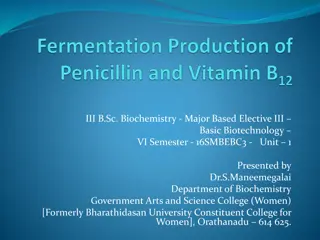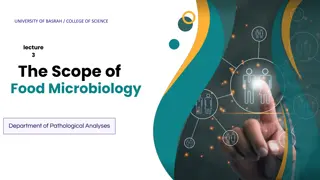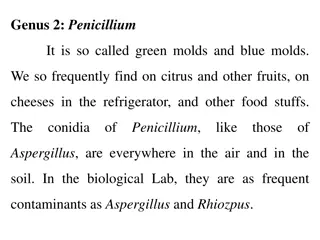Production of Penicillin in Biochemistry and Biotechnology
Penicillin is an antibiotic produced from high-yielding strains of Penicillium chrysogenum. The production process involves maintaining the strains as spore suspensions, inoculation methods, composition of inoculum, production medium requirements, and use of precursors like phenyl acetic acid deriva
0 views • 22 slides
Insights into Airborne Microorganisms and Fungi: Implications for Food Safety
Airborne microorganisms and fungi play crucial roles in food microbiology, with various species surviving in the atmosphere despite hostile conditions. Bacteria like Bacillus and Streptomyces disperse through air turbulence, while fungi such as Penicillium and Aspergillus produce spores resistant to
0 views • 9 slides
Understanding Penicillium: Importance and Applications
Penicillium is a genus of fungi crucial for cheese production, organic acid and antibiotic manufacturing. It plays a significant role in ecosystems as a decomposer. Learn about its systematic position and the key role Penicillium species play in various industries.
0 views • 7 slides
Insights into Penicillium and Gymnoascaceae Fungi
Penicillium fungi, known as green molds and blue molds, are commonly found on citrus fruits, cheeses, and other food items. Various Penicillium species can cause fruit decay and are used in antibiotic production. Gymnoascaceae fungi include dermatophytes and systemic pathogens for humans. Nannizzia
0 views • 6 slides



